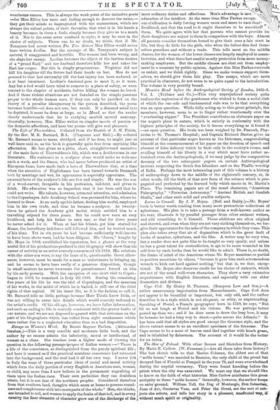learned to draw. At an early age his father, finding
him useful, employed Lacen in Council. By J. F. Boyes. (Bell and Daldy.)—Mr. Boyes' him in his own trade, and thus he became a sculptor. At twenty- book is better worth reading than many more pretentious collections of three he gained the Academy gold medal, which entitled him to a aphorisms. His plan is to take a passage from a well-known author as travelling stipend for three years. But he could now earn an easy his text, illustrate it by parallel passages from other eminent writers, livelihood, and help his father to earn one, so that for three years and add something to it himself. These additions are often original he never asked for it. When at last his friends got him started for and shrewd, and even when they are not very striking themselves, we for- Rome, the hereditary indolence still followed him, and he wasted much give their appearance for the sake of the company in which they come. This of his time. Yee in six years he had become sufficiently well-known plan also takes away that air of dogmatism which is the great fault of to have been above want, had he been diligent. His "Jason," bought by books of maxims, aphorisms, and the like. A writer may be very wise, Mr. Hope in 1803, established his reputation, but a glance at the very but a reader does not quite like to be-taught so very openly, and unless useful list of his productions prefixed to this biography will show that his he has a great talent for contradiction, is apt to be more wounded in his career of activity as an artist scarcely commenced till 1816. His relations self-love by such books than he would like to admit. There is, no doubt, with the other sex were, to say the least of it, questionable. Great allow- the frame of mind of the American whom Mr. Boyes mentions as partial =COB, however, must be made for a man so unfortanate in bringing up, to positive assertions by others, "because it gave him such a tremendous and he seems to have been really of a generous disposition, though wrench to kick out hard against nothing," but that is, we fear, excep- in small matters he never overcame the penuriousness forced on him tional. Mr. Boyes also deserves credit for his choice of extracts, which by his early poverty. With the exception of one short visit to Copen- are not of the usual well-worn character. They show a very extensive hagen in 1819, he remained in Italy till 1838. Daring the remaining acquaintance with English literature, and especially with our older five years of his life he was the idol of Copenhagen, and the museum dramatists and divines.
of his works, in the midst of which he is buried, is still one of the chief Cape Cod. By Henry D. Thoreau. (Sampson Low and Son.)—A sights of that capital. Of his inner life, as it is the fashion to call it, rather unnecessary importation from Massachussets. Cape Cod does Mr. Barnard tells us little, perhaps because Herr Thiele knew little, or not appear to be beautiful or important, but only odd, and the author was not willing to enter into details which would scarcely redound to describes it in a style which is not eloquent, or witty, or -anpretending. the artist's credit. Of his old age, however, we have fuller information, Speaking of Postel, a French geographer born in 1510, he says, "But and such an ending to life is scarcely consistent with the graver faults of let us not laugh at Postal and his visions. He was perhaps better our nature, and we are not disposed to quarrel with that reticence on the posted up than we ; and if he does seem to draw the long bow, it may part of his biographers which has veiled from sight weaknesses which be because he had a long way to shoot—quite across the Atlantic." It
were rather due to a neglected education than to a bad disposition, has been said, that all styles are good except the tiresome style, and the






























 Previous page
Previous page